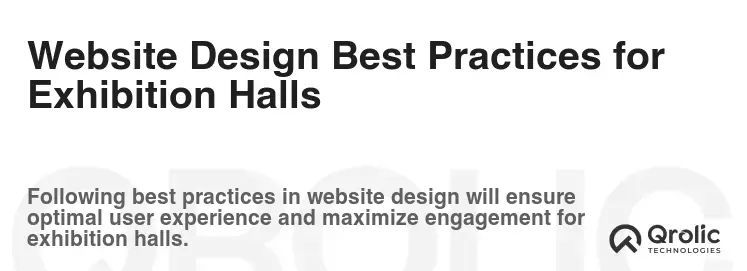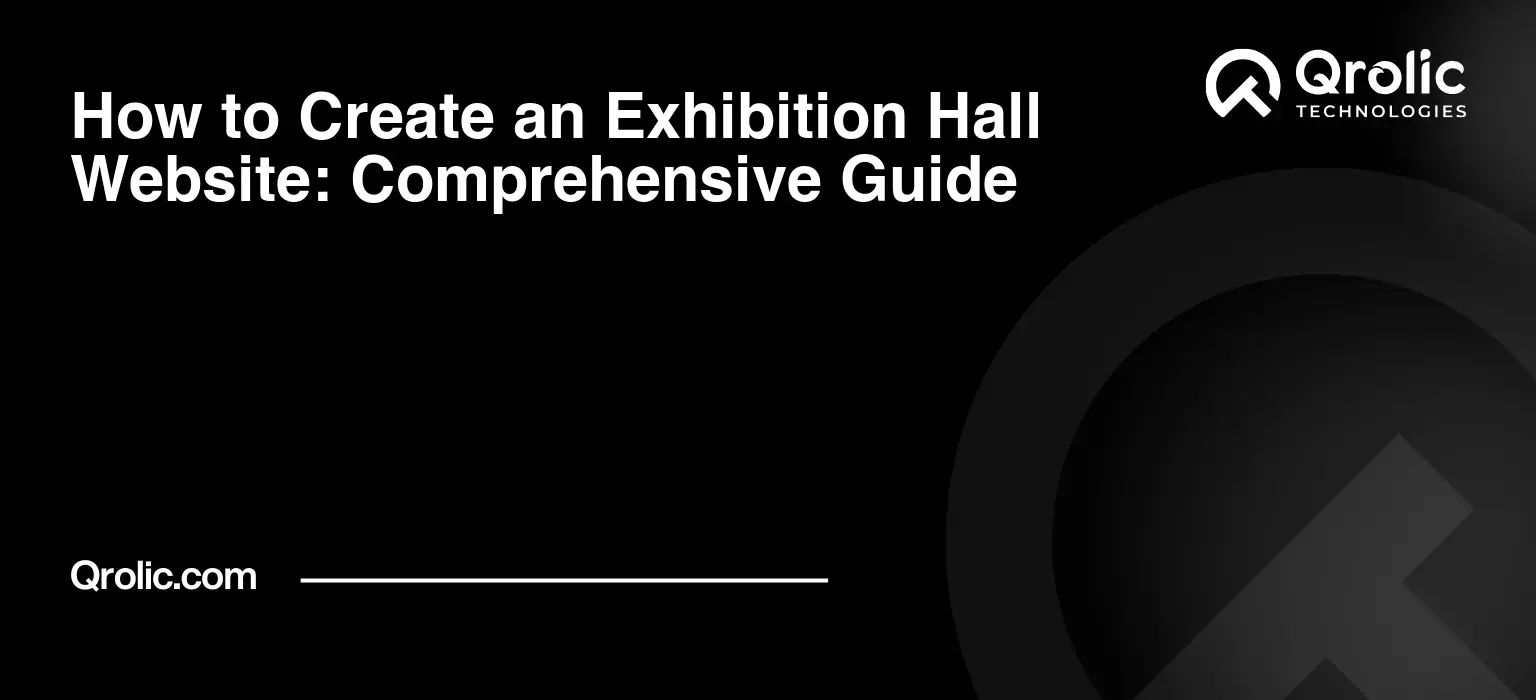The digital age has transformed how we discover, engage with, and ultimately, attend events. For exhibition halls, a compelling website is no longer optional – it’s the virtual storefront, the 24/7 salesperson, and the central hub for attracting exhibitors and attendees. This article delves deep into the art and science of website design for exhibition halls, offering practical strategies, actionable tips, and expert-level insights to help you create a website that not only looks stunning but also drives real business results.
Quick Summary:
- A powerful website attracts exhibitors and engages attendees.
- Include clear event details and exhibitor information.
- Optimize your site for search engines and mobile use.
- A strong website boosts your brand and efficiency.
Table of Contents
- Why a Powerful Website is Crucial for Exhibition Halls
- 1. Attracting Exhibitors: Your Digital Sales Pitch
- 2. Engaging Attendees: Creating Anticipation and Driving Registration
- 3. Strengthening Your Brand: Building Recognition and Authority
- 4. Improving Operational Efficiency: Streamlining Processes and Reducing Costs
- Key Elements of an Effective Exhibition Hall Website
- 1. Homepage: Making a Powerful First Impression
- 2. Event Calendar: Keeping Visitors Informed and Engaged
- 3. Exhibitor Information: Equipping Exhibitors for Success
- 4. Attendee Information: Enhancing the Attendee Experience
- 5. About Us: Building Trust and Credibility
- 6. Contact Us: Making it Easy to Connect
- Optimizing Your Website for Search Engines (SEO)
- 1. Keyword Research: Understanding What Your Audience is Searching For
- 2. On-Page Optimization: Making Your Website Search Engine Friendly
- 3. Off-Page Optimization: Building Your Website’s Authority
- 4. Technical SEO: Ensuring Your Website is Crawlable and Indexable
- Website Design Best Practices for Exhibition Halls
- 1. User-Centered Design: Prioritizing User Experience
- 2. Mobile-First Approach: Catering to the Mobile Audience
- 3. Visual Appeal: Creating a Captivating Experience
- 4. Clear Call-to-Actions: Guiding Visitors Towards Desired Actions
- 5. Analytics and Tracking: Measuring Your Website’s Performance
- Event Space Web Development: Choosing the Right Technology
- Trade Show Website Design: Catering to a Specific Niche
- Qrolic Technologies: Your Partner in Digital Success
- Conclusion: Your Website – The Key to Exhibition Hall Success
Why a Powerful Website is Crucial for Exhibition Halls

Before diving into the specifics of design, let’s underscore the fundamental importance of a well-crafted website for your exhibition hall. Consider these key benefits:
1. Attracting Exhibitors: Your Digital Sales Pitch
- Showcasing Your Space: High-quality images and virtual tours allow potential exhibitors to visualize their presence in your hall, fostering excitement and confidence.
- Highlighting Amenities: Clearly display available amenities, such as loading docks, internet access, catering options, and technical support, demonstrating your readiness to support successful events.
- Providing Detailed Information: Offer downloadable floor plans, technical specifications, and capacity charts to equip exhibitors with the information they need to make informed decisions.
- Building Credibility: Testimonials from past exhibitors and event organizers build trust and showcase your hall’s track record of success.
- Streamlining the Booking Process: An integrated booking system allows exhibitors to easily check availability, select their desired space, and submit their applications online, simplifying the entire process.
2. Engaging Attendees: Creating Anticipation and Driving Registration
- Event Calendar and Search Functionality: A comprehensive calendar showcasing upcoming events, coupled with a robust search function, allows attendees to easily find events that align with their interests.
- Detailed Event Information: Provide in-depth details about each event, including speaker bios, schedules, exhibitor lists, and interactive maps, to maximize attendee engagement.
- Online Ticketing and Registration: Integrate a secure online ticketing and registration system to streamline the process for attendees, minimizing friction and maximizing conversions.
- Multimedia Content: Use captivating videos, photos, and virtual tours to showcase the excitement and energy of past events, whetting attendees’ appetites for future gatherings.
- Promotional Offers and Discounts: Offer early-bird discounts, group rates, and other incentives to encourage early registration and maximize attendance.
3. Strengthening Your Brand: Building Recognition and Authority
- Consistent Branding: Maintain consistent branding across your website and all other marketing materials to create a unified and recognizable brand identity.
- Showcasing Your Expertise: Share informative blog posts, articles, and resources related to the events industry to establish your hall as a thought leader.
- Highlighting Unique Features: Clearly communicate what sets your exhibition hall apart from the competition, whether it’s its prime location, state-of-the-art facilities, or exceptional customer service.
- Building a Community: Create a forum or social media integration to foster a sense of community among exhibitors and attendees, encouraging interaction and engagement.
- Establishing Trust: Display industry certifications, awards, and affiliations to build credibility and reassure visitors of your hall’s professionalism and expertise.
4. Improving Operational Efficiency: Streamlining Processes and Reducing Costs
- Online Forms and Applications: Enable exhibitors and event organizers to submit applications, request quotes, and manage their bookings online, reducing paperwork and administrative overhead.
- Automated Communication: Use automated email marketing to keep exhibitors and attendees informed about upcoming events, deadlines, and important updates.
- Resource Library: Provide downloadable resources, such as floor plans, technical specifications, and exhibitor manuals, reducing the number of inquiries your staff needs to handle.
- FAQ Section: Address common questions about your hall, amenities, and booking process to reduce the burden on your customer service team.
- Analytics and Reporting: Track website traffic, user behavior, and conversion rates to identify areas for improvement and optimize your online marketing efforts.
Key Elements of an Effective Exhibition Hall Website

Now that we understand the “why,” let’s delve into the “what.” Here are the essential elements of a successful exhibition hall website:
1. Homepage: Making a Powerful First Impression
- Compelling Visuals: Use high-quality images and videos that showcase your hall’s best features and the excitement of past events.
- Clear Value Proposition: Immediately communicate what makes your hall unique and why exhibitors and attendees should choose you.
- Easy Navigation: Design a clear and intuitive navigation menu that allows visitors to quickly find the information they’re looking for.
- Call-to-Actions (CTAs): Use prominent CTAs to guide visitors towards key actions, such as “Book Your Event,” “View Upcoming Events,” and “Contact Us.”
- Mobile Responsiveness: Ensure your homepage looks great and functions flawlessly on all devices, from desktops to smartphones.
2. Event Calendar: Keeping Visitors Informed and Engaged
- Comprehensive Listing: Include all upcoming events, with detailed information about each event.
- Search and Filtering: Allow visitors to easily search for events by keyword, date, category, and other criteria.
- Event Details Pages: Provide detailed information about each event, including speaker bios, schedules, exhibitor lists, and interactive maps.
- Registration and Ticketing: Integrate a secure online registration and ticketing system.
- Social Sharing: Enable visitors to easily share events on social media.
3. Exhibitor Information: Equipping Exhibitors for Success
- Detailed Hall Specifications: Provide downloadable floor plans, technical specifications, and capacity charts.
- Amenities and Services: Clearly list all available amenities and services, such as loading docks, internet access, catering options, and technical support.
- Exhibitor Manual: Provide a comprehensive exhibitor manual that outlines all rules, regulations, and guidelines.
- Online Application: Offer an online application form that exhibitors can easily complete and submit.
- Testimonials: Showcase testimonials from satisfied exhibitors.
4. Attendee Information: Enhancing the Attendee Experience
- Event Details: Provide detailed information about each event, including speaker bios, schedules, exhibitor lists, and interactive maps.
- Registration and Ticketing: Integrate a secure online registration and ticketing system.
- Travel and Accommodation: Provide information about nearby hotels, transportation options, and local attractions.
- FAQ Section: Address common questions about attending events at your hall.
- Contact Information: Make it easy for attendees to contact your staff with any questions or concerns.
5. About Us: Building Trust and Credibility
- Company History: Share your hall’s history and mission.
- Team Bios: Introduce your team members and highlight their expertise.
- Awards and Certifications: Showcase any awards, certifications, or industry affiliations.
- Testimonials: Include testimonials from satisfied exhibitors and attendees.
- Contact Information: Provide clear and easy-to-find contact information.
6. Contact Us: Making it Easy to Connect
- Contact Form: Provide a user-friendly contact form.
- Phone Number and Email Address: Display your phone number and email address prominently.
- Physical Address: Include your hall’s physical address and a map.
- Social Media Links: Include links to your social media profiles.
- Live Chat: Consider adding a live chat feature to provide instant support.
Optimizing Your Website for Search Engines (SEO)

A stunning website is useless if no one can find it. Search engine optimization (SEO) is crucial for driving organic traffic to your website and attracting potential exhibitors and attendees. Here are some key SEO strategies:
1. Keyword Research: Understanding What Your Audience is Searching For
- Identify Relevant Keywords: Use keyword research tools like Google Keyword Planner, SEMrush, and Ahrefs to identify the keywords that your target audience is using to search for exhibition halls and events.
- Focus on Long-Tail Keywords: Target long-tail keywords (longer, more specific phrases) to attract highly qualified traffic. For example, instead of just “exhibition hall,” target “exhibition hall with catering near [City]”.
- Analyze Competitor Keywords: Analyze your competitors’ websites to identify the keywords they are targeting.
2. On-Page Optimization: Making Your Website Search Engine Friendly
- Optimize Title Tags and Meta Descriptions: Craft compelling title tags and meta descriptions that include your target keywords.
- Use Header Tags (H1-H6): Use header tags to structure your content and highlight important keywords.
- Optimize Image Alt Text: Use descriptive alt text for all images, including relevant keywords.
- Create High-Quality Content: Create informative and engaging content that is relevant to your target audience.
- Use Internal Linking: Link to other relevant pages on your website.
3. Off-Page Optimization: Building Your Website’s Authority
- Build High-Quality Backlinks: Earn backlinks from reputable websites in your industry.
- Promote Your Website on Social Media: Share your website content on social media to increase visibility.
- Participate in Online Communities: Engage in online communities and forums related to the events industry.
- List Your Website in Online Directories: Submit your website to relevant online directories.
4. Technical SEO: Ensuring Your Website is Crawlable and Indexable
- Ensure Your Website is Mobile-Friendly: Google prioritizes mobile-friendly websites.
- Improve Website Speed: Optimize your website for speed to improve user experience and search engine rankings.
- Create an XML Sitemap: Submit an XML sitemap to Google to help them crawl and index your website.
- Use HTTPS: Secure your website with HTTPS.
- Fix Broken Links: Regularly check for and fix broken links.
Website Design Best Practices for Exhibition Halls

Beyond the essential elements and SEO strategies, consider these best practices to create a truly exceptional website:
1. User-Centered Design: Prioritizing User Experience
- Understand Your Target Audience: Conduct user research to understand the needs and preferences of your target audience.
- Create User Personas: Develop user personas to represent your ideal exhibitors and attendees.
- Design with Accessibility in Mind: Ensure your website is accessible to users with disabilities.
- Test Your Website with Real Users: Conduct user testing to identify areas for improvement.
2. Mobile-First Approach: Catering to the Mobile Audience
- Design for Mobile First: Start with the mobile version of your website and then adapt it for larger screens.
- Use a Responsive Design: Ensure your website adapts seamlessly to different screen sizes.
- Optimize for Touchscreens: Make sure all buttons and links are easy to tap on touchscreens.
- Minimize Page Load Time: Optimize images and code to minimize page load time on mobile devices.
3. Visual Appeal: Creating a Captivating Experience
- Use High-Quality Images and Videos: Invest in professional photography and videography to showcase your hall’s best features.
- Choose a Consistent Color Palette: Use a consistent color palette that reflects your brand identity.
- Use Typography Effectively: Choose fonts that are easy to read and visually appealing.
- Use White Space to Create Balance: Use white space to create visual balance and improve readability.
4. Clear Call-to-Actions: Guiding Visitors Towards Desired Actions
- Use Prominent CTAs: Make your CTAs stand out visually.
- Use Action-Oriented Language: Use action-oriented language that encourages visitors to take action.
- Place CTAs Strategically: Place CTAs in prominent locations throughout your website.
- Test Different CTAs: Test different CTAs to see which ones perform best.
5. Analytics and Tracking: Measuring Your Website’s Performance
- Install Google Analytics: Install Google Analytics to track website traffic, user behavior, and conversion rates.
- Set Up Conversion Tracking: Set up conversion tracking to measure the success of your marketing campaigns.
- Analyze Your Data Regularly: Regularly analyze your data to identify areas for improvement.
- A/B Test Your Website: Use A/B testing to experiment with different elements of your website and see which ones perform best.
Event Space Web Development: Choosing the Right Technology

Selecting the right technology stack for your exhibition hall website is crucial for ensuring scalability, performance, and maintainability. Here’s a breakdown of key considerations:
- Content Management System (CMS): A CMS allows you to easily manage and update your website content without needing coding knowledge. Popular options include:
- WordPress: A highly versatile and widely used CMS with a vast library of plugins and themes. Ideal for content-rich websites and integrating with various marketing tools.
- Drupal: A robust and secure CMS suitable for complex websites with custom functionality. Often preferred by organizations with strict security requirements.
- Joomla: Another popular CMS offering a balance between ease of use and flexibility.
- E-commerce Platform (if needed): If you plan to sell tickets, merchandise, or other products online, you’ll need an e-commerce platform. Options include:
- WooCommerce (for WordPress): A popular e-commerce plugin for WordPress, offering a wide range of features and integrations.
- Shopify: A fully hosted e-commerce platform that is easy to use and offers a comprehensive set of features.
- Event Management Software Integration: Integrating with an event management software platform can streamline tasks such as registration, ticketing, and attendee communication.
- Hosting: Choose a reliable hosting provider that can handle the traffic volume of your website. Consider factors such as server location, bandwidth, and uptime guarantees.
Trade Show Website Design: Catering to a Specific Niche

If your exhibition hall primarily hosts trade shows, consider these specific design elements:
- Showcase Past Trade Shows: Feature detailed information and photos from past trade shows to attract both exhibitors and attendees.
- Highlight Industry Focus: Clearly communicate the industries that your trade shows cater to.
- Provide Exhibitor Resources: Offer resources specifically tailored to trade show exhibitors, such as booth design tips and marketing best practices.
- Offer Sponsorship Opportunities: Promote sponsorship opportunities to potential sponsors.
- Create a Dedicated Trade Show Calendar: Create a separate calendar specifically for trade shows.
Qrolic Technologies: Your Partner in Digital Success

At Qrolic Technologies (https://qrolic.com/), we understand the unique challenges and opportunities of the exhibition hall industry. We offer comprehensive website design and development services tailored to meet your specific needs, helping you attract exhibitors, engage attendees, and grow your business.
Our services include:
- Custom Website Design: We create visually stunning and user-friendly websites that reflect your brand identity and meet your business goals.
- Responsive Web Development: We ensure your website is fully responsive and optimized for all devices.
- SEO Optimization: We implement proven SEO strategies to drive organic traffic to your website.
- E-commerce Integration: We integrate secure e-commerce platforms to allow you to sell tickets, merchandise, and other products online.
- Event Management Software Integration: We integrate your website with event management software to streamline your operations.
- Website Maintenance and Support: We provide ongoing website maintenance and support to ensure your website is always up-to-date and running smoothly.
Contact us today to learn how we can help you create a website that drives real business results.
Conclusion: Your Website – The Key to Exhibition Hall Success

In today’s digital landscape, a well-designed and optimized website is no longer a luxury for exhibition halls; it’s a necessity. By focusing on the key elements outlined in this article, prioritizing user experience, implementing effective SEO strategies, and choosing the right technology, you can create a website that attracts exhibitors, engages attendees, strengthens your brand, and ultimately, drives the success of your exhibition hall. Embrace the power of the digital world and transform your website into your most valuable asset.







